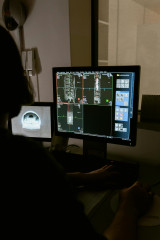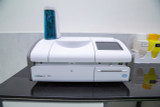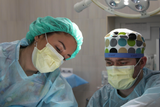Essential Lab Equipment for Small Clinics: A Buying Guide
Setting up or updating a small clinic's laboratory involves making strategic decisions about which equipment to invest in. This guide will help you choose essential lab equipment that is cost-effective, space-efficient, and capable of performing a range of fundamental diagnostic tests.
1. Microscopes
Every clinic's lab needs a reliable microscope. For clinical diagnostics, choose a compound microscope with capabilities for both brightfield and phase-contrast illumination. This versatility is crucial for viewing a variety of samples, from blood smears to bacterial cultures.
2. Centrifuges
Centrifuges are vital for blood analysis, urine sedimentation, and other fluid separations. A compact, benchtop model is ideal for small clinics, offering high-speed operation with variable settings to accommodate different tests.
3. Autoclaves
Sterilization is non-negotiable in any medical setting. Small clinics should opt for a benchtop autoclave, which is perfect for sterilizing instruments and other small items quickly and efficiently. Look for models with fast cycle times and minimal water usage.
4. Blood Chemistry Analyzers
These devices are crucial for basic metabolic panels, liver tests, and more. Consider a multiparameter analyzer that can handle a range of tests. This not only saves space but also allows for more comprehensive patient evaluations in-house.
5. EKG/ECG Machines
Cardiac health is a key concern, and an EKG machine is a must-have for any clinic. Portable models are available that do not compromise on accuracy and can easily connect to and integrate with other digital systems for patient record management.
6. Refrigeration
Proper storage of reagents, samples, and certain medications requires reliable refrigeration. A pharmaceutical-grade compact refrigerator with a precise temperature control ensures that all materials are stored under optimal conditions.
7. Hematology Analyzers
For full blood counts, a hematology analyzer is essential. These systems come in sizes suitable for small labs and can provide a complete blood count with differentials, which is invaluable for routine health screenings and diagnostic work.
8. Phlebotomy Supplies
Ensure you have a well-stocked area for blood sample collection, including comfortable chairs, disposable gloves, needles, tubes, and skin cleaning supplies. Efficient blood collection is fundamental to accurate lab work.
9. Point-of-Care Testing Kits
For rapid diagnostic tests such as influenza, strep A, and COVID-19, point-of-care testing kits can facilitate quick decision-making and improve patient outcomes.
10. Digital Documentation Tools
Digitally documenting lab results is critical for modern healthcare. Invest in lab software or systems that can integrate with your existing clinic management software to ensure seamless record-keeping and easy access to patient data.
Choosing Your Supplier
Selecting the right supplier for your lab equipment is as important as the equipment itself. Look for suppliers who offer:
- Competitive pricing and leasing options
- Installation services and staff training
- Excellent customer support and warranty programs
By carefully choosing the essential lab equipment, your clinic can perform necessary diagnostic tests efficiently and effectively, leading to better patient care and improved health outcomes. If you're looking to outfit your clinic with the latest in reliable and efficient lab technology, visit our comprehensive online catalog today.
Truway Health News & Insights
Preparing Your Clinic for the Summer Rush: Stock Up on These Supplies
As the warm months approach, clinics often experience an influx of patients seeking treatment for va...
Innovations in Medical Technology: Products That Are Changing Healthcare
The rapid pace of technological innovation is revolutionizing the healthcare industry. From advanced...
Essential Lab Equipment for Small Clinics: A Buying Guide
Setting up or updating a small clinic's laboratory involves making strategic decisions about which e...
The Latest Advances in Home Health Care Technology
The Latest Advances in Home Health Care TechnologyHome health care technology is rapidly advancing,...
Expert Interviews: Tips From Healthcare Professionals on Choosing Quality Supplies
When it comes to purchasing healthcare supplies, whether for personal use, a professional setting, o...
Success Stories: How Quality Healthcare Products Made a Difference
Success Stories: How Quality Healthcare Products Made a DifferenceIn the world of healthcare, the ri...







